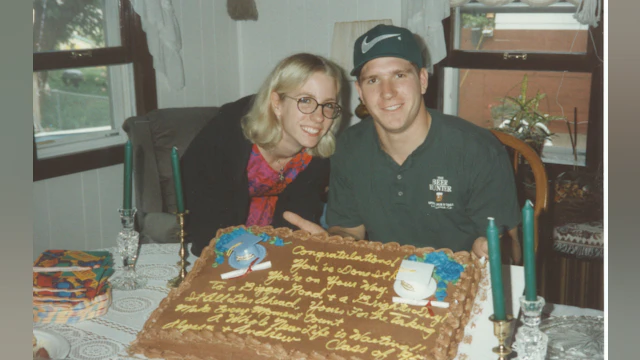It always starts with the same:
“We never thought…"
Then they trail off.
You can probably guess the often unspoken end of the sentence:
“…he would take his own life.”
I hear this sentiment repeatedly when I volunteer for suicide prevention.
Many survivors of suicide loss relate the same experience as mine: their loved one’s death by suicide was entirely unexpected.
And I also know that most people out there don’t care much about suicide prevention because they’ve had no personal experience with it themselves. It hasn’t happened to them yet. I get that. That was my thinking too.
The summer my twin brother Andrew and I were 20, we both went through a number of changes. I changed colleges and boyfriends. He worked his way through the various stages of becoming a hero: firefighter, EMT, paramedic. Yet Andrew was also working through self-doubt: in the back of his mind, he suspected that this type of work was not for him.
I knew he was not himself. He looked sad at times and said things that were out of character. He would get angrily annoyed with me over the silliest things, like when I tried to change the oil in my car and stripped the bolt. When I asked him why he wasn’t replacing his stolen CDs, he remarked it was because, “I’m getting old.”
I looked at him askance, but I never thought that… So I never asked. Never prodded him to get help. Never offered up anything to assuage his mental anguish the way I would offer to get him Gatorade if he was physically sick.
The big difference between mental and physical illness is that when we suspect someone is sick with a cold or losing weight for no reason, we insist they see a doctor and hound them until they do. Or they themselves tell us they are sick. It’s not often someone hides their bout of the flu the same way they do their depression. They moan about the body aches and the fever. They ask for 7-Up.
Not so much with mental health. The stigma can feel overpowering. People fear that speaking out about their struggles will lead to being ostracized or facing judgment, rather than acceptance and help. And people realize that from the outside, a loved one can’t often see mental illness taking control of them in quite the same way cancer does.
To compound all of this, many with mental illness get bogged down by a mind that is lying to them, whispering that no one can help.
So they don’t get help. And they suffer.
Sometimes, they die.
Which is why we all need to care about suicide prevention and mental health. When we do, everything changes. The stigma is silenced. The judgment is avoided. The way things look becomes irrelevant. The fear becomes hope.
To be fair, most of us never care about much of anything until it affects us personally, both mental and physical illness. I never thought having hand, foot and mouth disease was a big deal until I contracted it this past summer and was crying in a tub of cool oatmeal and water. Now I cringe to hear some kid is suffering with it too.
Much of my recovery over my brother’s death was in private and alone. This was largely because I am a private person, but also because the stigma and judgment I felt from others encouraged me to keep things to myself. I became so utterly defeated and tired of people not knowing what to say to me, or them looking aghast when I told them that I’d lost my twin to suicide.
So I worked through his my brother’s death with just one support group and lots of personal reading and writing. I went on solitary trips to the cemetery to visit his grave and talk to him. At times I had to force myself to not get stuck in the loop of grief, and that itself felt like a betrayal. It was as if my moving on meant losing my connection to him. But I did what I had to so I could be whole and me.
It worked.
Ten years later, I felt fairly well-healed. But I also felt it was high time for a change. The American Foundation for Suicide was holding an Out of the Darkness Overnight Walk for those who had survived a suicide loss, and I joined with no trepidation in my heart. It was one of the best decisions of my life. During my months of training, I walked endless miles by myself, thinking about my brother. In the evenings, I spent countless hours asking for donations and writing thank you’s. During the walk, I reflected on how the loss of Andrew was truly integral to my life, how very much I missed him, and how profound and empowering this event was for me. It was a final step of sorts in my grieving process. Taking that walk made me who I am today.
In the years since, I’ve gone from being walker, to a volunteer, to an advocate with AFSP. I truly believe that suicide and mental health are everyone’s business because some days we suffer, and some days we don’t. It’s the days people suffer that concern me, and I’m determined that people will no longer suffer in silence.
So often I hear from people, “I never thought...”
But it might. You may never expect it, but you just might lose someone you love to suicide. Everyone has mental health just like physical health, and it’s perfectly possible that either of those will take a turn toward illness at some point.
If we work together to change the conversations and attitudes about mental illness in this country, we can stop saying, “I never thought…” about our family and friends.
We can start today by asking, “What can I do for you? Are you okay?”
How easy is that?
